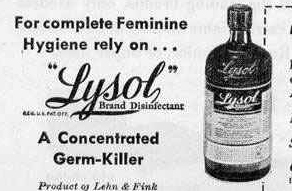Libby Copeland at Slate has a really good article about how advertisers have historically marketed personal hygiene products--particularly new ones--by creating an anxiety for consumers and then oh-so-conveniently providing them the cure for it. This has long been effective marketing strategy for feminine hygiene products as well as deodorant.
Writes Copeland:
Certainly there's been a good dose of shame-marketing towards ladies' down theres, as Copeland explains. She highlights the use of Lysol as a douche.Dove recently unveiled its latest campaign, and it hinges on the idea that your armpits are ugly. Dove Ultimate Go Sleeveless is supposed to give women "softer, smoother underarms in just five days"—in ads for the product, which Stephen Colbert calls a "breakthrough shame-o-vation," women cut the sleeves off their tops with joyful expressions, as if they've been liberated from a terrible scourge. If it's news to you that this part of your body is not so hot, Dove says you're in the minority, citing a survey in which 93 percent of women said they "think their underarms are unattractive." And if you doubt statistics culled from 534 women in an anonymous online poll, rest assured that Dove's best advertising efforts will be directed at making those numbers true.Pity the poor deodorant-makers. What else are they to do? As the Wall Street Journalpoints out, they're in a bind—almost the entire U.S. population already uses deodorant, and consumers appear reluctant to switch to new brands. Dove's empowerment-via-shame marketing approach for Go Sleeveless has its roots in advertising techniques that gained popularity in the 1920s: a) pinpoint a problem, perhaps one consumers didn't even know they had; b) exacerbate anxiety around the problem; c) sell the cure.The history of ads directed at women is particularly rich with such fear tactics. Thus, ad copy from the 1920s and '30s warned women of their place in the "beauty contest of life" (a corset manufacturer) and reminded them that "The Eyes of Men …The Eyes of Women/ Judge your Loveliness every day" (Camay soap). A 1953 ad for Chlorodent toothpaste stated point-blank: "There's another woman waiting for every man." Yikes!
The unfortunate truth was that as a contraceptive, Lysol was ineffective, not to mention dangerous. Improperly diluted, it burned and blistered the vagina, and in some cases even caused death. Yet, Tone writes, it wasn't until the pill came along that Lysol douche was supplanted as the top choice of women looking to prevent pregnancy.
I've read about Lysol douching probably 100 times over the years, and I still cannot wrap my mind around the horribleness of the idea. I barely use any strong chemically-cleaning things, but sometimes I use Lysol to clean the bathroom. And when I do, I'm paranoid as shit. I super super dilute it, wear gloves, turn on the fans, and tell my cats to stay away so the fumes don't damage their sensitive little nosies. So the idea of using it to clean out the holiest of holies (so to speak) sounds just downright awful. (Although mentioning that this was the top birth control method before The Pill gives it some significant context.)
After reading this piece, I realized that all of the campaigns and products mentioned were marketed towards women. Surely similar tactics have been used to sell stuff to men as well, yes? I'd be interested to see how ad campaigns like this directed towards men differ from those direct towards women.




1 comments:
I can't imagine douching with Lysol!!! I'm a Summer's Eve girl and even that is a bit strong for me down there.
Post a Comment